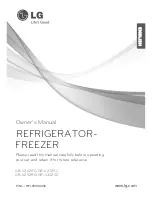
SUGGESTIONS ON FOOD STORAGE
14
STORING FOOD
●
Store fresh food in the refrigerator compartment. How food is frozen and thawed is an important
factor
in maintaining its freshness and flavor.
●
Do not store food which goes bad easily at low temperatures, such as bananas, pineapples, and
melons.
●
Allow hot food to cool prior to storing. Placing hot food in the refrigerator could spoil other food and
lead to higher electric bills!
●
When storing, cover food with vinyl wrap or store in a container with a lid. This prevents moisture from
evaporating and helps food to keep its taste and nutrients.
●
Do not block air vents with food. Smooth circulation of chilled air keeps refrigerator temperatures
even.
●
Do not open the door frequently. Opening the door lets warm air enter the refrigerator, causing
temperatures to rise.
FREEZER COMPARTMENT
●
Do not store bottles in the freezer compartment - they may break when frozen.
●
Do not refreeze food that has been thawed. This deteriorates taste and nutrition.
●
When storing frozen food like ice cream for a long period, place it on the freezer shelf,
not in the door rack.
●
Avoid storing any food close to the bottom area of the freezer shelf to keep efficient air circulation.
REFRIGERATOR COMPARTMENT
●
Avoid placing moist food deep inside refrigerator shelves, it could freeze upon direct contact
with chilled air.
●
Always clean food prior to refrigeration. Vegetables and fruits should be washed and wiped,
and packed food should be wiped clean to prevent adjacent food from spoiling.
●
When storing eggs in their storage rack, ensure that they are fresh. Always store them in a upright
position, which keeps them fresh longer.




































